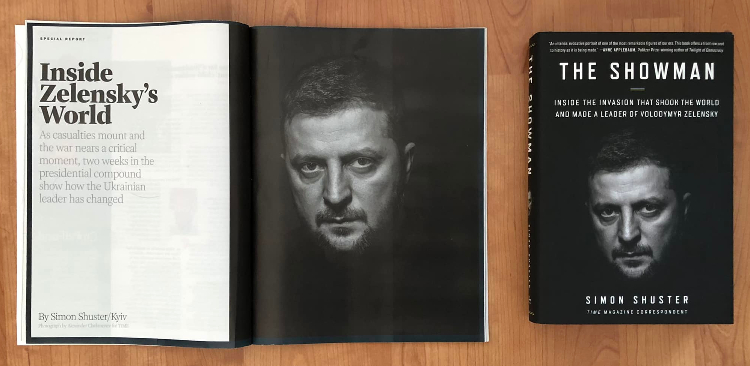
Simon Shuster’s superb new book The Showman: Inside the Invasion That Shook the World and Made a Leader of Volodymyr Zelensky, published last week, is a unique profile of Ukraine’s President, from a writer who has spent more time with Zelensky and his inner circle than any other journalist. Shuster has reported on Zelensky for Time magazine since 2019, and his dispatches throughout the Russia-Ukraine war have been essential reading. He was embedded in the presidential compound for months on end, yet his reporting on Zelensky has remained scrupulously objective.
Zelensky cooperated with Shuster to such an extent that the President’s staff raised objections to it, as the author explains in his prologue: “Some of Zelensky’s aides, in particular the ones responsible for his security, did not always appreciate the access the president gave me, especially on the days when he invited me to travel with him to the front. He never explained his reasons for doing that. His staff only said that he trusted me to write an honest account.” When Shuster initially proposed the book, the President, with a degree of modesty, “felt he had not lived or achieved enough to be the focus of a biography.”
Shuster praises Zelensky’s bravery as a wartime leader, and admires the President’s genuine and selfless concern for his people. But although this is an authorised biography, it’s certainly not a hagiography. Shuster makes clear, for example, that Zelensky was at fault for Ukraine’s lack of preparedness when the war began: “He had spent weeks playing down the risk of a full-scale invasion and assuring his people that all would be fine. He had refused the advice of his military commanders to call up all available reserves and use them to fortify the border. Apart from the calamity of the invasion itself, the president would need to face his own failure to foresee it.”
Rather than the exaggerated Churchillian comparisons made by some other journalists, Shuster’s assessment of Zelensky is surprisingly ambivalent. He even admits to being “worried” about the President’s potential commitment to democracy in a post-war Ukraine, once restrictions on the media are eventually lifted: “I don’t know how Zelensky will handle that fraught transition, whether he will have the wisdom and restraint to part with the extraordinary powers granted to him under martial law, or whether he will, like so many leaders throughout history, find that power too addictive.”
Zelensky cooperated with Shuster to such an extent that the President’s staff raised objections to it, as the author explains in his prologue: “Some of Zelensky’s aides, in particular the ones responsible for his security, did not always appreciate the access the president gave me, especially on the days when he invited me to travel with him to the front. He never explained his reasons for doing that. His staff only said that he trusted me to write an honest account.” When Shuster initially proposed the book, the President, with a degree of modesty, “felt he had not lived or achieved enough to be the focus of a biography.”
Shuster praises Zelensky’s bravery as a wartime leader, and admires the President’s genuine and selfless concern for his people. But although this is an authorised biography, it’s certainly not a hagiography. Shuster makes clear, for example, that Zelensky was at fault for Ukraine’s lack of preparedness when the war began: “He had spent weeks playing down the risk of a full-scale invasion and assuring his people that all would be fine. He had refused the advice of his military commanders to call up all available reserves and use them to fortify the border. Apart from the calamity of the invasion itself, the president would need to face his own failure to foresee it.”
Rather than the exaggerated Churchillian comparisons made by some other journalists, Shuster’s assessment of Zelensky is surprisingly ambivalent. He even admits to being “worried” about the President’s potential commitment to democracy in a post-war Ukraine, once restrictions on the media are eventually lifted: “I don’t know how Zelensky will handle that fraught transition, whether he will have the wisdom and restraint to part with the extraordinary powers granted to him under martial law, or whether he will, like so many leaders throughout history, find that power too addictive.”
